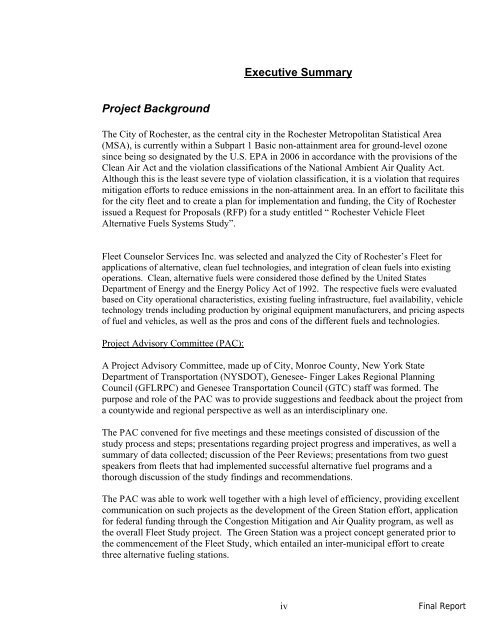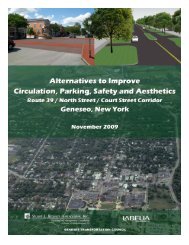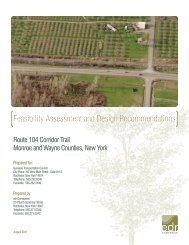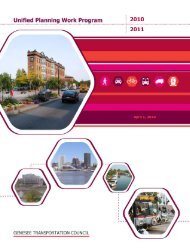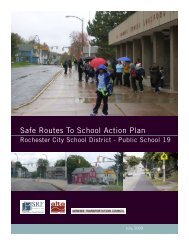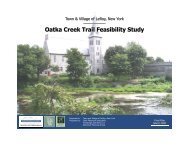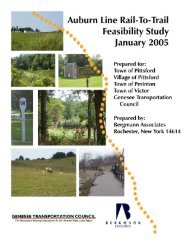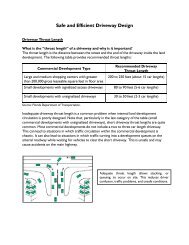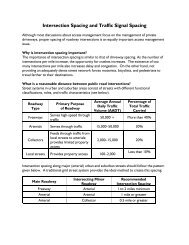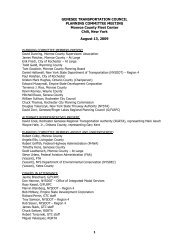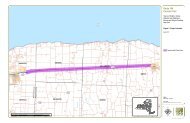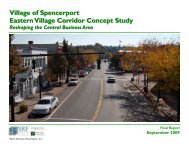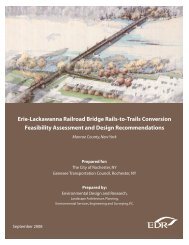Final Report Rochester Vehicle Fleet Alternative Fuels Systems Study
Final Report Rochester Vehicle Fleet Alternative Fuels Systems Study
Final Report Rochester Vehicle Fleet Alternative Fuels Systems Study
Create successful ePaper yourself
Turn your PDF publications into a flip-book with our unique Google optimized e-Paper software.
Executive Summary<br />
Project Background<br />
The City of <strong>Rochester</strong>, as the central city in the <strong>Rochester</strong> Metropolitan Statistical Area<br />
(MSA), is currently within a Subpart 1 Basic non-attainment area for ground-level ozone<br />
since being so designated by the U.S. EPA in 2006 in accordance with the provisions of the<br />
Clean Air Act and the violation classifications of the National Ambient Air Quality Act.<br />
Although this is the least severe type of violation classification, it is a violation that requires<br />
mitigation efforts to reduce emissions in the non-attainment area. In an effort to facilitate this<br />
for the city fleet and to create a plan for implementation and funding, the City of <strong>Rochester</strong><br />
issued a Request for Proposals (RFP) for a study entitled “ <strong>Rochester</strong> <strong>Vehicle</strong> <strong>Fleet</strong><br />
<strong>Alternative</strong> <strong>Fuels</strong> <strong>Systems</strong> <strong>Study</strong>”.<br />
<strong>Fleet</strong> Counselor Services Inc. was selected and analyzed the City of <strong>Rochester</strong>’s <strong>Fleet</strong> for<br />
applications of alternative, clean fuel technologies, and integration of clean fuels into existing<br />
operations. Clean, alternative fuels were considered those defined by the United States<br />
Department of Energy and the Energy Policy Act of 1992. The respective fuels were evaluated<br />
based on City operational characteristics, existing fueling infrastructure, fuel availability, vehicle<br />
technology trends including production by original equipment manufacturers, and pricing aspects<br />
of fuel and vehicles, as well as the pros and cons of the different fuels and technologies.<br />
Project Advisory Committee (PAC):<br />
A Project Advisory Committee, made up of City, Monroe County, New York State<br />
Department of Transportation (NYSDOT), Genesee- Finger Lakes Regional Planning<br />
Council (GFLRPC) and Genesee Transportation Council (GTC) staff was formed. The<br />
purpose and role of the PAC was to provide suggestions and feedback about the project from<br />
a countywide and regional perspective as well as an interdisciplinary one.<br />
The PAC convened for five meetings and these meetings consisted of discussion of the<br />
study process and steps; presentations regarding project progress and imperatives, as well a<br />
summary of data collected; discussion of the Peer Reviews; presentations from two guest<br />
speakers from fleets that had implemented successful alternative fuel programs and a<br />
thorough discussion of the study findings and recommendations.<br />
The PAC was able to work well together with a high level of efficiency, providing excellent<br />
communication on such projects as the development of the Green Station effort, application<br />
for federal funding through the Congestion Mitigation and Air Quality program, as well as<br />
the overall <strong>Fleet</strong> <strong>Study</strong> project. The Green Station was a project concept generated prior to<br />
the commencement of the <strong>Fleet</strong> <strong>Study</strong>, which entailed an inter-municipal effort to create<br />
three alternative fueling stations.<br />
iv<br />
<strong>Final</strong> <strong>Report</strong>


